By Abdul Gani, TwoCircles.net,
Guwahati: They came braving the brightest sun on a summer noon to express their feelings. This is a bunch of people of Palhaji, a remote area of Barpeta district in Assam, some 100 odd kilometre from state capital Guwahati who are given a platform by newly launched monthly magazine ‘Balichanda’ to express their problems. Because the problems they are facing in their day to day life are more painful than the scorching summer sun.
The magazine edited by Char Sapori Sahitya Parishad (CSSP) president Hafiz Ahmed is an effort to bring the voice of such people whose voice is never heard. “The problems of these people have never been the problem of the state. They have been living in the country for second class citizen. So, here is an effort on our part to bring their problems on record. We cannot change their destiny but we can try to make their voice heard,” said Hafiz Ahmed.
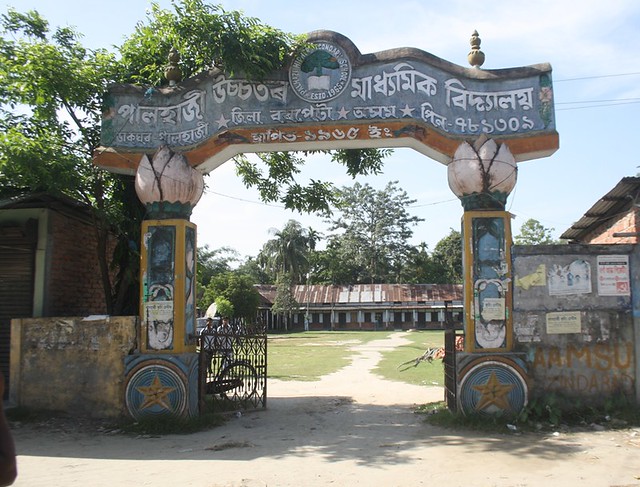
Palhaji HS School where the meet took place.
Accordingly, Hafiz Ahmed and co travel to the remotest parts of the state where these downtrodden people reside once in every month to listen to their voice organizing an event called Raij Mel which means Public meet in Assamese.
Palhaji Edition of Raij Mel
Probably one of the most neglected areas of the state at the present time. The people of the locality were pretty excited to meet the team as they hardly get such an opportunity when somebody listens to their problems leave alone solving it.
“Sometimes we feel like orphans. Why on earth the government has no time to have a look at us. We are being treated as second class citizen as if we have no right to get the facilities given by the constitution of India,” rued 86 year old Omar Uddin Khan who is the first of the entire locality to have a Bachelor degree in Science in 1958 from Cotton College.
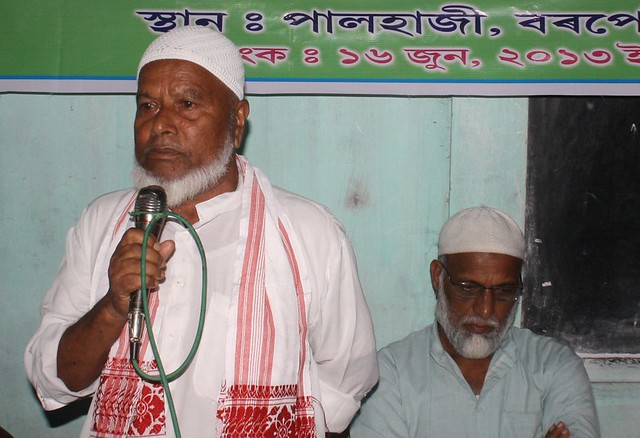
Noted educationist Omar Uddin Khan addressing the gathering
Palhaji is a place where most of the people work in agriculture field and do petty trade to make ends meet. And they have number of problems from transportation to health care system and many others.
Erosion and demand of a bridge
This is one of the deadliest problems the entire state is facing and the Palhaji residents are also no exception. So far, since the independence the area has lost around 20 villages to the mighty Brahmaputra thus making around 2 lakh people homeless.
“So, this is the reality. But the important thing is that these 2 lakh people have no proper address at the present time. Some have settled in some forest areas while the others have left for other places as daily wage earners. There has not been any helping hand from the government for these people,” Khan, one of the senior most person of the locality who was also the principal of Mandia Higher Secondary School said.
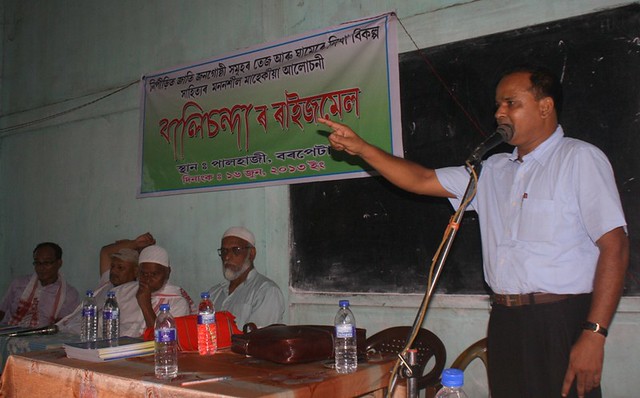
Author and poet Khabir Ahmed delivering lecture
He also said that earlier it was 10 kilometres to the river from Palhaji market which has been reduced to mere 1 kilometre. “We think, in the next 10 years or so we will be no where if appropriate steps are taken. All the important places including the Sattras (Vashnavite Monastery) will be washed out,” said Mujibur Rahman, another local.
So, they all urge upon the government to come to the place and do something. Their demands include a bridge over Brahmaputra connecting Bohori and Sontoli in Kamrup district. “If it can happen in Goalpara and in Dibrugarh why not here? This is also one of the busiest areas. This will bring a solution to a long time problem of transportation besides the erosion,” Khan added.
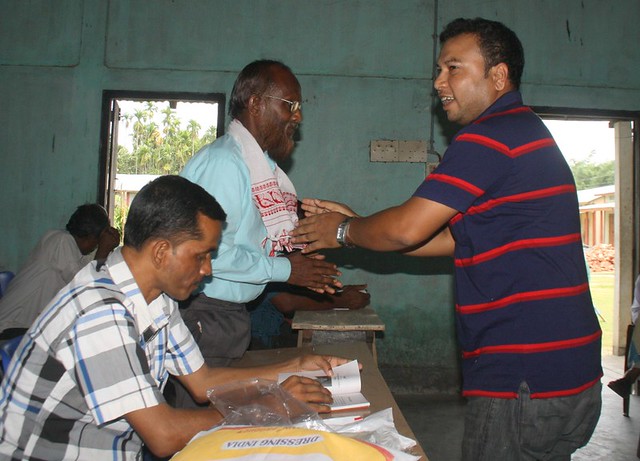
Local youth Imadadullah felicitates senior citizens of the locality
Poor Health Care Facility
There is just a Primary Health Centre (PHC) at a place called Bhella six kilometre from Palhaji to cater the need of around 1.5 lakh people. Otherwise, all they have to go to Barpeta which is around 15 kilometres away. Whereas, according to the department of health of Assam government norm a PHC should be there for every 20, 000 people.
“Moreover, the road are so poor that during summers we have to face horrible moments to travel here and if you have a patient with you, it’s hell,” said Imdadullah, a local youth.
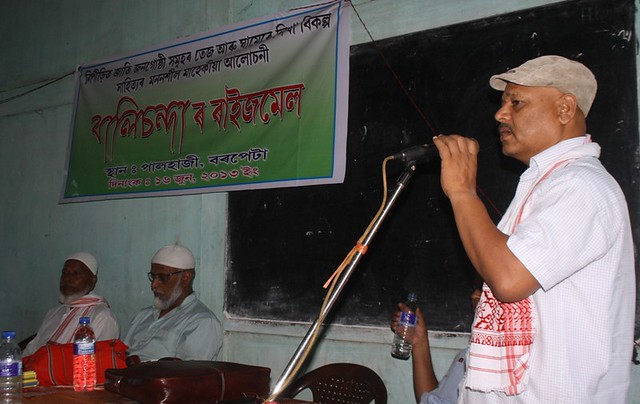
Balichanda editor Hafiz Ahmed delivering his lecture
Agriculture, poor economy and the victims of chit funds
Though most the people engage in agriculture activities of the locality, there is hardly any facility for them to better performance. “Our farmers still engage in age old systems. There is no facility for irrigation to water the fields,” said one of them.
Another shocking thing here is that there is no branch of any bank for the need of the locals and as a result many were became the victims of the chit funds. People either have to go to Bhella or Patbausi for banking activities.
“As there was no banks the chit funds could easily made the poor simple people to invest money in them. This was really unfortunate how these poor people were looted. So, we demand that at least one branch of any nationalized bank should be here at Palhaji,” Imdadullah added.
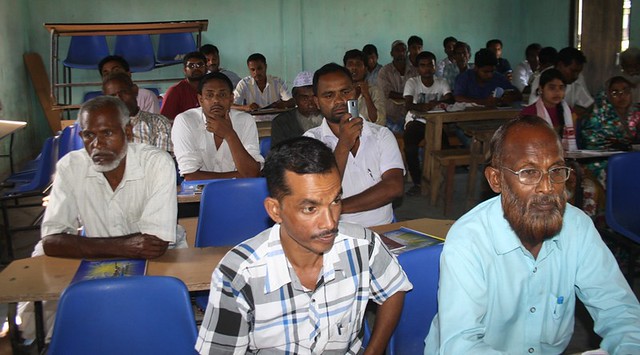
The gathering at the meet
Bangladeshi Tag
Another humiliating pain these people are suffering is from the Bangladeshi tag.
“Every now and then people would say us Bangladeshi. We were born and brought up here like any other. It is true that our forefathers have migrated from the undivided Bengal way back in beginning of 20th century. So, it’s very embarrassing,” said Talebar Rahman, principal of Palhaji Higher Secondary School.
He also said that when the erosion affected people who are go out seeking jobs are often targeted as Bangladeshi people.
The Balichanda magazine team also felicitated the students of the locality who excelled in the recently declared class 10 and 12th exams.
“Our sincere efforts will continue to make their voice heard. Otherwise they are neglected as second class citizens. Be it religious minorities, the tea tribe people and others who have been suffering in oppression and suppression, we will try to give them a voice,” said Khabir Ahmed, author and poet.

